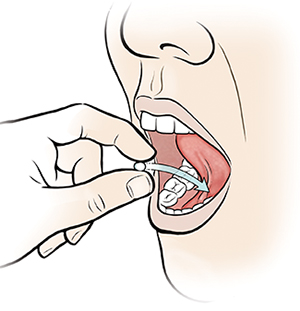Understanding Sublingual Immunotherapy
Sublingual immunotherapy is a treatment that may help with your allergies. It's sometimes called SLIT. It may ease your symptoms if you are allergic to dust mites, grass, or ragweed. An allergen is any substance that causes an allergic reaction.
Sublingual means under the tongue. It refers to how you do the treatment. You put a small dose of allergen, in the form of a tablet, under your tongue.

Why sublingual immunotherapy is done
This treatment helps ease your allergies by giving small amounts of an allergen to you over time. Your body should start to build up a tolerance to the allergen. As a result, symptoms such as a runny nose, itchy eyes, or congestion may greatly improve or may even go away completely.
This treatment can be done in place of allergy shots (subcutaneous immunotherapy). After the first dose, you may not have to see your healthcare provider for each dose. Discuss this option with your healthcare provider. Dosing must be done daily and is usually done at home. The treatment is relatively safe with mild side effects that can usually be easily treated.
How sublingual immunotherapy is done
Your first dose is done under the supervision of your healthcare provider. This is so the provider can watch you for any signs of a severe allergic reaction. You will have to stay in the office for at least 30 minutes after you take the dose. If there are no problems, you will likely be able to do it by yourself going forward.
-
Place the tablet under your tongue.
-
Wait for the tablet to dissolve, about 1 to 2 minutes. You can then swallow.
-
Don’t drink or eat anything for at least 5 minutes after a dose.
-
You may have some minor reactions, such as itching or swelling in your mouth or stomach problems. These symptoms should lessen over time as you take each dose.
-
Give yourself a dose once a day or as often as your healthcare provider tells you to. For the best results, you may need to do this for several years.
This therapy is often started about 3 months before allergy season. Talk with your healthcare provider about what you should do if you miss a dose. If you have asthma, don’t take a dose if your asthma isn’t under control, and talk to your healthcare provider for further instructions.
Risks of sublingual immunotherapy
-
Mouth or throat problems, such as itching, swelling, or ulcers
-
Heartburn or trouble swallowing
-
Severe allergic reaction. An anaphylactic reaction is usually rare but could happen. Ask your healthcare provider if you need an epinephrine auto-injector.
Online Medical Reviewer:
Deborah Pedersen MD
Online Medical Reviewer:
Jessica Gotwals RN BSN MPH
Online Medical Reviewer:
Rita Sather RN
Date Last Reviewed:
11/1/2022
© 2000-2024 The StayWell Company, LLC. All rights reserved. This information is not intended as a substitute for professional medical care. Always follow your healthcare professional's instructions.